
These Hands - Ariele - Director at HSDC
- Subject:
- Education
- Social Science
- Social Work
- Special Education
- Material Type:
- Lesson
- Date Added:
- 12/16/2020

These Hands - Ariele - Director at HSDC

This is a remix from Dr. Jennifer Burns -- Dynamics of Interpersonal Relations I, is an exploration of the small-group process through participation, interpretation and study. Major focus is on the class itself as an interacting group providing for personal, interpersonal, and intellectual challenge.The modules are designed for undergraduate students to become familiar with group dynamics. This resource has a syllabus, OpenStax text chapters, TedTalks and group activities.
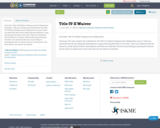
Overview: Title IV-E Waiver Wraparound Collaborative
Summary: This site contains the materials for the Title IV-E Waiver Wraparound Collaborative course. There are materials that we are asking the participants to copy and bring with them to the class. There are materials that the Resource Center will provide for participants and there are materials that we are providing to participants that we ask for them to review prior to the class that do not need to be printed.

Overview: Title IV-E Waiver Wraparound Collaborative
Summary: This site contains the materials for the Title IV-E Waiver Wraparound Collaborative course. There are materials that we are asking the participants to copy and bring with them to the class. There are materials that the Resource Center will provide for participants and there are materials that we are providing to participants that we ask for them to review prior to the class that do not need to be printed.
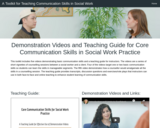
This toolkit is a resource for any instructor who teaches communication skills in either a face-to-face or online environment. It includes five videos demonstrating basic communication skills and a teaching guide for instructors.
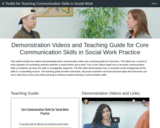
This toolkit includes five videos demonstrating basic communication skills and a teaching guide for instructors. The videos are a series of short vignettes of counselling sessions between a social worker and a client. Four of the videos target one or two basic communication skills so students can learn the skills in manageable segments. The fifth video demonstrates how a counsellor would amalgamate all the skills in a counselling session. The teaching guide provides transcripts, discussion questions and exercises/role plays that instructors can use in both face-to-face and online teaching to enhance student learning of communication skills.
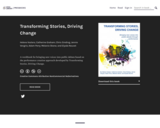
Short Description:
A workbook for bringing new voices into public debate based on the performance creation approach developed by Transforming Stories, Driving Change.
Long Description:
Can theatre bring new voices into public debate? Facilitating theatre workshops with community members who experience social marginalization is an art that, when done well, feels more like magic. But even the best facilitators are not magicians. With this workbook we pull back the curtain on the magic by taking readers behind the scenes of the Hamilton-based research and performance initiative Transforming Stories, Driving Change (TSDC.) Since 2015, TSDC teams have worked alongside community partners and performer-advocates to make plays designed to draw attention to the voices and visions of people whose opinions are not often represented in discussions of the future of the City. Through our performances, we have tried to contribute to building the movements that can make public leaders more accountable to people who are affected by their decisions. Five years and four plays later, we offer this workbook as a practical guide to TSDC’s creative approach.
Word Count: 51178
(Note: This resource's metadata has been created automatically by reformatting and/or combining the information that the author initially provided as part of a bulk import process.)
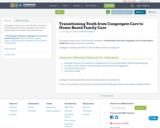
This page provides access to the Northern Academy's Transitioning Youth from Congregate Care to Home-Based Family Care required classroom materials.

This brief book serves as an instructor for a self-help course that will be offered to persons who have been through a terrible experience. Once you find yourself in the position of supporting a person who has experienced trauma, the book walks you through the various steps that are needed of you.

Short Description:
Trauma Informed Behaviour Support: A Practical Guide to Developing Resilient Learners guides educators working with primary school aged children to understand trauma as well as its impact on young children's brains, behaviour, learning, and development. The book provides a novel framework of practice – drawing on contemporary theories of developmental trauma and evidence-based practices of positive behaviour support. Practical strategies and tools are offered for educators to use to create strength-based environments that support children's recovery, resiliency and learning. Educators are introduced to the systemic impacts of traumatic stress and are provided with trauma-informed practices that they can use to support workforce development that enhance the quality of pedagogical practices, while promoting the safety and care of the school community.
Word Count: 56771
ISBN: 978-1-998755-50-9
(Note: This resource's metadata has been created automatically by reformatting and/or combining the information that the author initially provided as part of a bulk import process.)
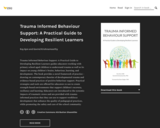
Short Description:
Trauma Informed Behaviour Support: A Practical Guide to Developing Resilient Learners guides educators working with primary school aged children to understand trauma as well as its impact on young children's brains, behaviour, learning, and development. The book provides a novel framework of practice – drawing on contemporary theories of developmental trauma and evidence-based practices of positive behaviour support. Practical strategies and tools are offered for educators to use to create strength-based environments that support children's recovery, resiliency and learning. Educators are introduced to the systemic impacts of traumatic stress and are provided with trauma-informed practices that they can use to support workforce development that enhance the quality of pedagogical practices, while promoting the safety and care of the school community.
Word Count: 56931
ISBN: 978-0-6487698-3-5
(Note: This resource's metadata has been created automatically by reformatting and/or combining the information that the author initially provided as part of a bulk import process.)
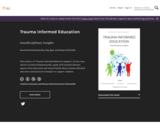
Interdisciplinary Insights
Short Description:
The authors of ‘Trauma Informed Behavior Support’, Dr Kay Ayre and Dr Govind Krishnamoorthy, speak with interdisciplinary experts from education and mental health about trauma informed education and practical strategies to support students.
Long Description:
As an educator, have you ever wondered about students, “Why can’t she just control her behaviour?” or “Why did he do that?” The demands of the classroom, and the scrutiny of teachers, often leave little time for teachers to consider the complex needs of children experiencing traumatic stress. Drawing on their lived experience and professional expertise, the conversations with trauma-informed education experts in this unique book offer educators an opportunity to develop a deeper understanding of the needs of students and strategies for responding with compassion and empathy. In a time of rapidly emerging scientific discovery, and social and political challenges, this book encourages educational leaders to question the fundamental assumptions of dominant pedagogical practices and sets the foundations for innovation in education.
Word Count: 41663
ISBN: 978-0-6453261-8-5
(Note: This resource's metadata has been created automatically by reformatting and/or combining the information that the author initially provided as part of a bulk import process.)
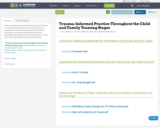
There are materials that we are asking the participants to copy and bring with them to the class. There are materials that the Resource Center will provide for participants and there are materials that we are providing to participants that we ask for them to review prior to the class that do not need to be printed.

Includes cases based on the author’s own 10-year experience working in emergency contexts with displaced populations in 11 countries across the world.
Focuses on the mental health of displaced populations from a uniquely psychological, sociocultural, and ecological perspective.
Provides practical applications for non-specialist professionals working with displaced populations in complex institutional systems.
Is an open access book.
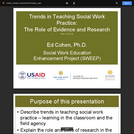
The role of evidence and research in social work practice.
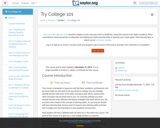
This course is designed to equip you with the basic academic, professional, and personal skills you will need to be successful in college. You are probably already familiar with some of the skills and topics that will be covered here; other concepts may be brand-new to you. For example, perhaps you have already learned some effective test-taking strategies that work well for you, but you have never heard of the concept of learning styles. Or, you may be familiar with your learning style, but you want to improve your listening skills and learn how to adapt your learning style to a new academic environment.
Each student will have a different skill set when he or she starts this course. The point of this course is to give you, a new college student or a person considering a college education, a purposeful, thorough overview of the many tools and skills needed for undergraduate success, as well as to help you understand how you can improve each of these skills over time. Keep in mind that the terms skills, tools, and resources can refer to academic, social, psychological, and emotional skills and techniques as well as physical objects such as books and supplies.
You may be tempted to consider some of the broad learning outcomes that are outlined in this course as unimportant for your immediate success in college. For example, you may wonder whether it is really worth your time to think about your long-term career goals or your exercise habits at the very beginning of your college experience. However, having a sense of purpose that motivates you and a lifestyle that supports your ability to focus on your academic goals are the basic building blocks of success in college and beyond.
The first unit of this course will help you determine your goals for your college education. In other words, you will have the opportunity to thoughtfully answer the question, why am I pursuing an undergraduate degree? Knowing the answer to this question will help you stay motivated when you encounter challenges during your college experience. In units 2 and 3 of this course, you will learn how to manage your personal space and time in order to maximize your ability to learn. In units 4 through 8 of this course, you will explore the learning process itself and the different skills and tools you can use to improve your academic performance. Unit 9 focuses on tests and test-taking, a subject that can cause great anxiety for many students. Units 10 and 11 provide you with general strategies for effectively communicating with college instructors as well as managing stress, anxiety, and other factors that affect your academic goals and overall health during college. Being a college student can present unique and new challenges to your health, and staying healthy, both physically and mentally, are crucial components of your success. Unit 12 of this course addresses the importance of your social life to your college success, and unit 13, the final unit of this course, equips you with some tools to help prepare you for a career after college.
By the end of this course, you will have gained a comprehensive overview of the skills, tools, and resources you will need for a successful, healthy, and happy college experience. You will understand how to apply the concepts discussed in this course to your individual academic and personal goals, and to practice the skills you have learned by testing them in specific college courses that you plan to take or are already taking. Finally, you will possess a strong starting point for applying your newfound skills to your job search and your career beyond college.

Beetles such as ladybugs and carpet beetles are one of the pest which are very difficult to avoid. They can be very destructive, worse and difficult to control. Pest control techniques can be used to eliminate the effects of these beetles. A well trained and experienced Nassau County pest control professional can help you to gain control of these pests in the most cost-effective manner.

An interactive reference work on the UN Sustainable Development Goals with short introductions to the goals, the official translations and numbering of the 17 goals and the 169 underlying targets, zoom in / zoom out at goal or target level, powerful search function, and "deep" hyperlinks to the UN website about the goals.Compact and online available interactive reference work that can be useful in all kinds of learning activities related to the SDGs.Currently available in English, Spanish, French and Dutch.Free to use online, but also to download and "embed" in other websites (HTML5); the source code is also freely available (MMAP).

An interactive reference work on the UN Sustainable Development Goals with short introductions to the goals, the official translations and numbering of the 17 goals and the 169 underlying targets, zoom in / zoom out at goal or target level, powerful search function, and "deep" hyperlinks to the UN website about the goals.Compact and online available interactive reference work that can be useful in all kinds of learning activities related to the SDGs.Currently available in English, Spanish, French and Dutch.Free to use online, but also to download and "embed" in other websites (HTML5); the source code is also freely available (MMAP).
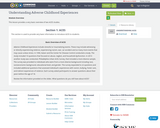
This lesson provides a very basic overview of two ACES studies.